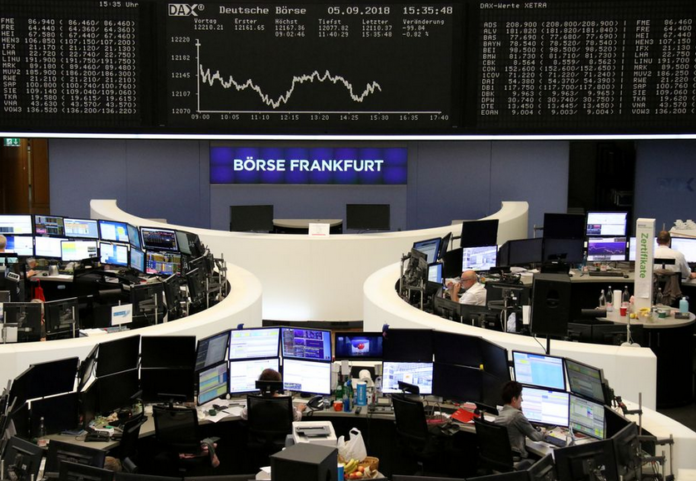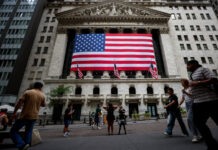
European stocks rose as key elections held center stage and investors grew more optimistic about Federal Reserve interest-rate cuts following US economic data that supported the case for easing.
France’s CAC 40 benchmark index advanced for a second day in the buildup to this weekend’s final round of voting in snap parliamentary elections. Voting is underway in the UK’s general election, with the first official exit poll expected soon after 10 p.m. local time.
Europe’s regional Stoxx 600 index climbed 0.6%, with banks the leading gainers. US equity futures contracts were little changed, with cash markets shut for Independence Day, after the S&P 500 and Nasdaq 100 set fresh record highs on Wednesday. A gauge of dollar strength dropped for a third day.
Global stocks are on track for their longest stretch of weekly gains since March, driven by a series of soft US economic data, which has revived hopes for a September rate cut. Reports on Wednesday showed the American services sector contracted at the fastest pace in four years, while the labor market saw further signs of softening before Friday’s key jobs figures.
“With the ISM services yesterday falling to 48.8, the weakest since the pandemic and job claims deteriorating, ultimately the negative data is being seen as positive for markets,” said Justin Onuekwusi, chief investment officer at St James Place. “It feels like September is the date everyone is now looking at.”
In individual stock moves, Continental AG rallied as much as 12% after the tiremaker flagged strong growth in China. Pandora A/S fell after an analyst highlighted the raw-material cost pressures confronting the Danish charm-bracelet maker.
Thursday’s broader gains for stocks were stronger in Asia, where an MSCI gauge for the region rose to its highest in over two years. Japan’s Topix climbed to a record high. The yen strengthened after hitting its lowest level against the dollar since 1986 in the previous session.
On France, Morgan Stanley strategists said investors should buy the country’s stocks before Sunday’s vote, because the market is likely to rebound in either of the two most probable outcomes.
French bonds already have been lifted by the political maneuvering that seeks to block Marine Le Pen’s National Rally from winning an absolute majority in the National Assembly, Morgan Stanley’s Marina Zavolock and Regiane Yamanari wrote in a report. Stock investors should follow their lead and add exposure to the country, they said.
A French Treasury bond sale Thursday — the second since President Emmanuel Macron called the snap vote — went smoothly, adding to signs that concerns over risks to the nation’s finances are abating. The gap between French and German 10-year yields has narrowed to 68 basis points from last week’s peak of 86 basis points.
“The market is clearly more relaxed about the political risk in France,” Onuekwusi at St James said. “It seems like people are seeing value in the French market as Macron and the left-wing alliance form a partnership which should prevent the vote being split and that’s positive in terms of the second round and for bond markets too.”
Back on the US rates front, minutes from the Fed’s June policy meeting showed officials were awaiting evidence that inflation is cooling and were divided on how long to keep borrowing costs elevated. Friday’s US jobs report will provide the next piece of major data as investors assess the path for rates. Economists anticipate a 190,000 gain in June non-farm payrolls — less than the previous month — with the unemployment rate holding at 4%.
Meanwhile, traders are tracking speculation that President Joe Biden could scrap his run for re-election after last week’s disastrous debate with Donald Trump heightened concerns the 81-year-old Democrat is too old to serve another term. Wall Street has started shifting money between assets that would be affected by a November Trump victory.
“The UK and French elections will be more of a temporary concern for the markets,” Adrian Zuercher, chief investment officer at UBS AG Private Banking told Bloomberg Radio. “Trump is a different story, particularly, the trade war situation. We will have to see how aggressive he will be on tariffs and that might resonate a little bit longer” with markets, he said.
Bitcoin fell for a third day, with traders citing factors including the drama around Biden’s candidacy and potential government sales of the tokens as contributing to the slide in the largest cryptocurrency.
In commodities, oil dropped from a two-month high as traders assessed lower US crude inventory data and the severity of Hurricane Beryl. Iron ore futures climbed to the highest level in nearly a month on optimism for improvement in demand from China.
Key events this week:
- UK general election, Thursday
- US Independence Day holiday, Thursday
- Eurozone retail sales, Friday
- US jobs report, Friday
- Fed’s John Williams speaks, Friday
Some of the main moves in markets:
Stocks
- The Stoxx Europe 600 rose 0.5% as of 3:11 p.m. London time
- S&P 500 futures were little changed
- Nasdaq 100 futures fell 0.2%
- Futures on the Dow Jones Industrial Average were little changed
- The MSCI Asia Pacific Index rose 1.2%
- The MSCI Emerging Markets Index rose 1.1%
Currencies
- The Bloomberg Dollar Spot Index fell 0.2%
- The euro rose 0.1% to $1.0800
- The Japanese yen rose 0.4% to 161.12 per dollar
- The offshore yuan was little changed at 7.2967 per dollar
- The British pound rose 0.1% to $1.2758
Cryptocurrencies
- Bitcoin fell 4% to $57,172.38
- Ether fell 4.6% to $3,106.24
Bonds
- The yield on 10-year Treasuries was little changed at 4.36%
- Germany’s 10-year yield advanced one basis point to 2.60%
- Britain’s 10-year yield advanced two basis points to 4.19%
Commodities
- Brent crude fell 0.1% to $87.21 a barrel
- Spot gold rose 0.1% to $2,358.98 an ounce















